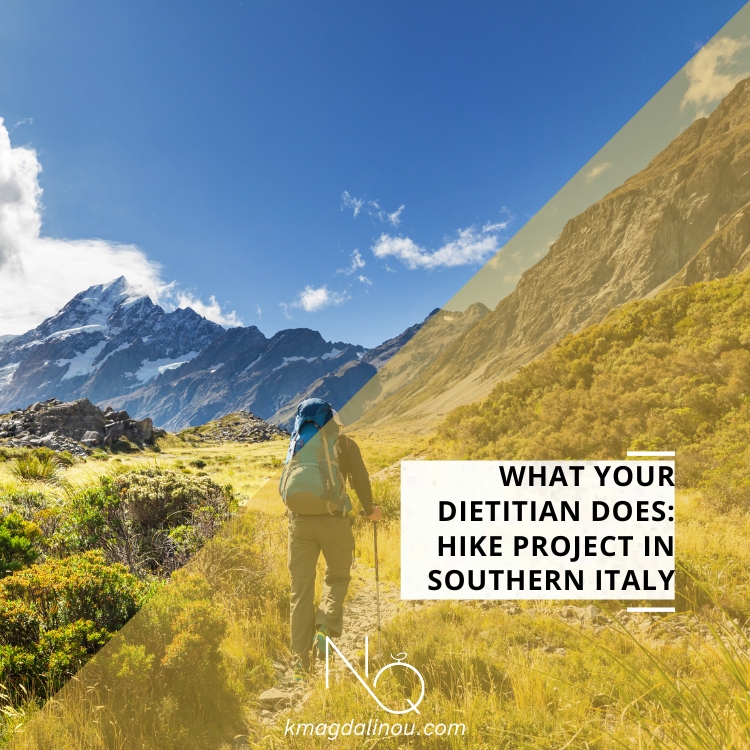Read about a four-day event focused on health, physical activity, and a healthy lifestyle that took place in one of the most beautiful places in Italy. Of course, your dietitian couldn’t miss it!
What is the HIKE Project?
The HIKE project was founded by the European Union under the Erasmus+ program to encourage a healthier lifestyle through excursions on cultural and historical trails in Europe. It’s a collaborative effort that includes historic routes in Italy, Greece, and Turkey.
The project’s acronym stands for “HIKing for a healthier lifestyle,” aiming to promote healthy living, deepen the understanding of our shared heritage, and build a community passionate about hiking and excursions.
How did your dietitian discover the HIKE Project?
I heard the words "walking," "healthy lifestyle," and "southern Italy," and that was enough! Walking is one of my favorite forms of aerobic exercise, and when it comes to a healthy lifestyle, there’s no need to ask me twice! I trained well in Italy during my internship at the University Hospital of Padua, but I hadn’t returned since then. Italy feels like coming full circle after five years of professional experience and training —or, more accurately, like returning to a place that always gives birth to beautiful experiences for me.
Impressions from the HIKE Project
I attended the first four days of the event, which took place in Puglia, Italy, from September 12-15. We began with a lecture at the University of Bari, where local authorities and organizers spoke. They also discussed proper preparation for the hike, as well as ideal nutrition before, during, and after.
We walked the southern part of the Via Francigena, a historic route that stretches from London to Puglia, Italy, covering up to 4,000 kilometers. Our journey started from Bari to Mola di Bari on a 10 km route through vineyards, and centuries-old olive trees. The next day, we trekked from Mola di Bari to Polignano a Mare, and the path was absolutely stunning. Autumn weather, clouds drifting overhead, and the sea crashing against the rocky coastline to our left. The 18.5 kilometers were manageable and suitable for a fit person, leading us to a cosmopolitan town. Some of our fellow travelers continued as far as Monopoli on Sunday, but I had to return to Greece at some point.
The HIKE Project initially got me to book tickets to Bari for a hike, but I came back with so much more. I experienced part of the Via Francigena, a historic road dating back to the Middle Ages that was used by traders, travelers, and pilgrims. I got a taste of Puglia and its beautiful towns, which, I must admit, reminded me of home. I shared carefree moments with people full of enthusiasm for life, nature, and hiking. I visited museums, castles, and historical sites, guided by the program. I sampled local delicacies such as riso, patate e cozze (rice, potatoes, and mussels—yes, two carbs in one Mediterranean dish, because everything works fine when in moderation!), taralli in various flavors, pizza, Italian breakfasts, local wines, and charcuterie. Overall, I returned to Athens richer and refreshed.
My HIKE Project Experience
It was the best. All of our fellow travelers were eager to meet one another, socialize, and share their own experiences, stories, and bond as a team. Our common ground was hiking, but the more we walked together, the more I realized we share a common path through time. We are united by the Via Francigena, a UNESCO World Heritage Site, the beautiful waters of the Mediterranean, traditions, the Mediterranean Diet (which is also an intangible cultural heritage of humanity), and much more.
Walking Saves Lives
The recommendation for exercise is clear. According to the latest guidelines from the UK's National Health Service (NHS), we need to engage in at least 150 minutes of moderate-intensity physical activity per week or 75 minutes of vigorous exercise. Ideally, exercise should be spread across 4-5 days per week, or even daily. Additionally, resistance exercises should be included at least twice a week, and long periods of immobility or sitting should be minimized. Brisk walking during a hike is a great form of moderate-intensity activity, perfect for taking care of our health.
Exercise acts as a protective shield. Regular physical activity reduces the risk of coronary heart disease, stroke, type 2 diabetes, bowel cancer, breast cancer (for women), premature death, osteoarthritis, hip fractures, falls (in older adults), depression, dementia, and Alzheimer’s disease. In short, walking saves lives.
Plan Your Own Expedition!
The HIKE Project is the perfect opportunity to get out of your chair and plan a health-boosting excursion—both physical and mental—without much hassle or organization. All you need to do is fill out the interest form for your chosen trek. The forms are available in the host country's language and only take a few minutes to complete. The hikes, guides, and additional activities (e.g., museum tours, yoga classes, etc.) are free of charge—unless otherwise stated. You only need to arrange your own transportation and accommodation.
The HIKE Project continues in Greece this October and in Turkey this November. Check the links I’ve included in the text for the information you need. While you mull over the idea of hiking, don’t forget to go for a leisurely walk in your neighborhood or nearby park tonight.
Prepare your excursion to our beloved Edessa here: https://hike-project.eu/hikes/via-egnatia-greece/
Have fun and strengthen your NQ!




